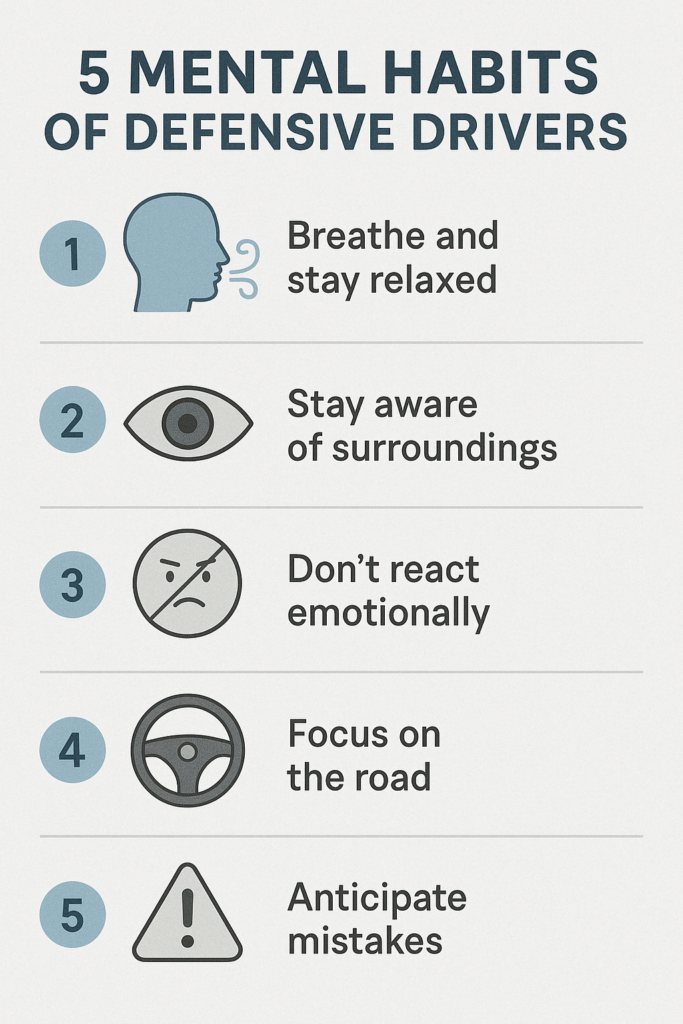The Psychology of Defensive Driving: Staying Calm and Focused Behind the Wheel
Defensive driving focus is one of the most important habits a Nova Scotia driver can build. Every time you hit the road — whether it’s downtown Halifax or a quiet stretch outside Truro — how calm and focused you are affects your ability to avoid accidents and make smart choices.
Table of Contents
- Why Defensive Driving Focus Matters on the Road
- Common Distractions and Mental Triggers in Nova Scotia
- 5 Mental Habits of Defensive Drivers
- What to Do If You’re Losing Focus While Driving
- Learn More About Defensive Driving Focus and Training
- Final Thought
Why Defensive Driving Focus Matters on the Road
Many collisions are caused not by poor skills, but by a lack of mental focus. Defensive driving focus helps drivers anticipate hazards, avoid distractions, and stay in control when others aren’t. In Halifax or on Nova Scotia’s rural highways, keeping your mind clear is as vital as using your mirrors.
Common Distractions and Mental Triggers in Nova Scotia
Our region brings unique driving challenges — and plenty of potential distractions. Fog, rain, aggressive drivers, or even a busy passenger can pull your focus off the road. Defensive drivers recognize these stressors and adjust mentally, not just physically.
- Heavy traffic and construction detours
- Tailgaters or speeding vehicles behind you
- Phone alerts or GPS rerouting
- Weather changes like fog or glare
5 Mental Habits That Improve Defensive Driving Focus
Staying mentally sharp is part of every good defensive driving strategy. Here are five simple ways to improve your focus and confidence on the road:
- Pause and breathe at stoplights. It helps keep your mind clear, especially after a stressful moment.
- Scan often, not just occasionally. Mirror checks, quick glances, and constant awareness reduce tunnel vision.
- Don’t drive emotionally. Letting go of minor frustrations helps you focus on what really matters.
- Talk yourself through decisions. Narrating road activity — out loud or in your head — helps with clarity.
- Give yourself a buffer. Rushing leads to stress. Leaving earlier builds in calm and focus automatically.

What to Do If You’re Losing Focus While Driving
Even the best drivers lose focus now and then. If you catch yourself zoning out or getting agitated behind the wheel:
- Lower background noise (radio, passengers, phone)
- Take three slow, deep breaths
- Loosen your grip and adjust your posture
- Mentally check back in by identifying what’s ahead: “light ahead, merging car, curve coming”
These small resets bring you back into the moment — and back into control.
Learn More About Defensive Driving Focus and Training
If you’re interested in learning more about how to stay mentally sharp on the road, our defensive driving course in Halifax covers focus, calmness, and reaction techniques in greater depth.
You can also check out Canada’s official road safety site for additional national tips on staying alert and safe on the road.
Final Thought
Defensive driving focus isn’t just a concept — it’s a daily practice. The more calm and clear you are, the more prepared you’ll be for whatever Nova Scotia roads throw your way. Driving safely starts in your mind.
The information provided on this post is for general informational purposes only and is not intended to serve as professional advice or guidance. While Artin Driving School strives to ensure the accuracy and timeliness of the information shared, Artin Driving School makes no guarantees, warranties, or representations regarding the completeness, reliability, or suitability of any content posted.





